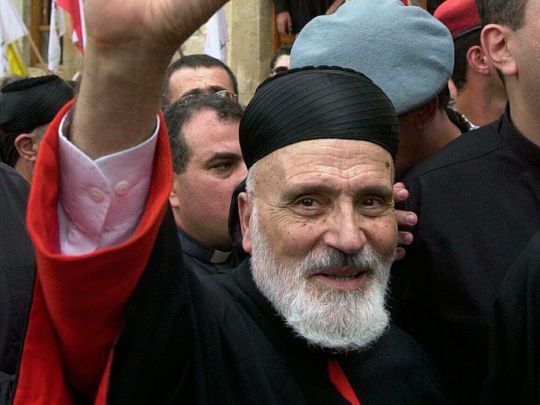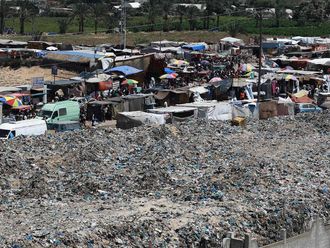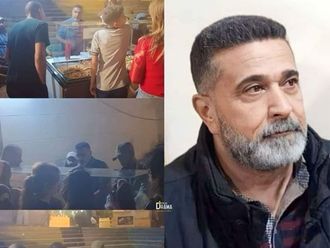
Beirut - Lebanon's Maronite Christian church says its former patriarch, Cardinal Nasrallah Butros Sfeir, has died after several days in hospital. He was 98.
Sfeir, an outspoken and feisty personality, served as spiritual leader of Lebanon's largest Christian community through some of the worst days of the 1975-90 civil war.
He then played a key role in shaping the country's postwar politics as one of the most prominent Christian leaders in the mostly Muslim region.
The former patriarch passed away early Sunday at a Beirut hospital. The church issued a statement saying "The Maronite church is orphaned and Lebanon is in sadness."
Cardinal Bechara Rai, who succeed Sfeir in 2011, called on churches to ring their bells and hold prayers for the late leader.
Former Maronite Patriarch Mar Nasrallah Boutros Sfeir passed away at the Hotel Dieu Hospital in Beirut, days before celebrating his 99th birthday.
The aging patriarch, a towering figure in Lebanese society, rose to prominence during the country’s civil war, for opposing inter-Christian fighting in 1988, famously siding with Samir Geagea of the Lebanese Forces against then prime minister, now president, Michel Aoun.
He was also renowned for aggressively opposing Syrian tutelage over Lebanon and blessing the “Cedar Revolution” that led to the withdrawal of Syrian forces in 2005.
Early life
Sfeir was born in the village of Rayfoun in the Keserwan district in May 1920, fourth months before the creation of the modern republic of Lebanon.
He studied philosophy and theology at the prestigious Saint Joseph University, graduating in 1950, the very same year in which he was ordained to priesthood.
He steadily rose the clerical ladder, becoming secretary of the Patriarchal Sea in 1956, and was elected Maronite Patriarch by the Council of Bishops on 27 April 1986.
His position was confirmed by Pope John Paul II, with whom Sfeir had an exceptionally warm relationship, and whom he hosted in Beirut during the patriarchal visit to Lebanon back in May 2001.
“It was thanks to his efforts that the Great Pope visited Lebanon,” celebrated Lebanese television host Giselle Khoury, said.
“The Pope said to Lebanese Christians: This is your land and you need to protect and preserve it. This was the message as well of Patriarch Sfeir.”
Rivalry with Aoun
Sfeir steered clear from politics during the first ten years of the Lebanese civil war but started speaking out after then-Prime Minister Aoun launched a “war of elimination” against his Christian rival, Geagea.
Christian neighbourhoods that had been spared from violence of the Lebanese conflict were bombed—for the first time in years—by Aoun, sparking outrage among Lebanese Christians.
Twenty-three deputies met under Sfeir’s auspices in 1989, demanding a halt to inter-Christian fighting.
Sfeir never hid his mistrust of Aoun, who sent thugs into Sfeir’s office to beat and humiliate the patriarch—an action that is being strongly remembered today, with Aoun seated at Baabda Palace, expected to take part in Sfeir’s funeral this week. In 2009, the two men met briefly at the conference of Maronite bishops and cardinals, hoping to bury the hatchet after their 20-year-old feud.
Nationalist to the core
In 2001, Sfeir blessed the Qornet Shehwan Gathering, a coalition of Christian statesmen demanding an end to Syrian military presence in Lebanon.
He put his full weight behind young Lebanese demonstrators, who took to the streets in February 2005, after the assassination of former Prime Minister Rafik Hariri, demanding a final exodus of Syrian troops, in accordance with UNSCR 1559.
“He was the nationalist godfather of the independence movement of 2005,” said prominent Lebanese analyst Fadi Akoum.
Speaking to Gulf News, he added: “Earlier he had blessed the Druze-Maronite rapprochement, which stopped the bloodshed in Mount Lebanon. He also put his weight behind the Taif Accords, which many are trying to topple today.”
“Patriarch Sfeir was subjected to heavy pressure to visit to Damascus, but he was very clear that he will only visit Damascus if he returns with Lebanese prisoners held in Syrian jails. If he was going to give them cover with any visit, then at least he should get something humanitarian in return,” Khoury, said, describing as a “modern thinker” who was “down to earth”.
“His legacy was refusing to squander an inch of Lebanese soil.”
Due to old age, Sfeir resigned from office on 26 February 2011 and was replaced by the incumbent Patriarch Bechara Al Raii.
The aging cardinal slowly slipped out from the public eye, retiring to the Patriarchal Sea where he lived and worked for his most of his adult life.
In 2011, he criticised his successor’s plans to visit Syria, shortly before outbreak of the present conflict, citing Syria’s continued interference in Lebanese politics.
- With inputs from Agencies










_resources1_16a30b3523c_small.jpg)

